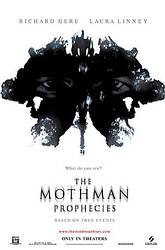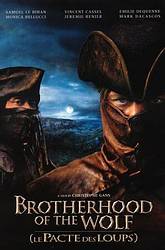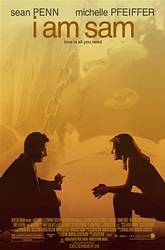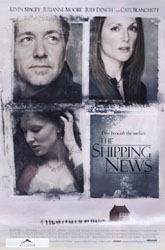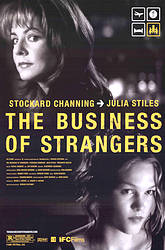 Director: Starring:
OTHER REVIEWS: Cruel
Intentions Novocaine Panic Tape |
The Business of Strangers BY: DAVID PERRY The business world can be a cutthroat business, or so the cinema wants you to believe. People who work white-collar jobs in those huge skyscrapers of the modern metropolis have little heart under their Armani suits and DKNY ties. Enron is not really helping this working class go up in everyone's estimation either. The new film The Business of Strangers tackles the same old shtick of the neo-artistic view of a cold business world. Startup.com was just the (albeit real) primer to the way The Business of Strangers views its road weary, plane-hopping elite. Director-writer Patrick Stettner worked in one of these offices before getting his break as a filmmaker -- his eyes were closely kept on the beaten souls walking by his desk every day. This is not to say that The Business of Strangers is completely against the world of execs and their conglomerates, but it is foreboding in its worry for the way this world treats its own. The easiest view of this film would be to call it the image of a sick and demented mind, but the real central theme seems on the way the business world has made the occurrences found in The Business of Strangers possible. Julie Styron (Channing) is the executive vice president for some fictional firm -- her job seems to be little more than traveling from city-to-city showing her firm's work to prospective client. When the film opens, she has just gotten off of her plane for a one-day rally through a city before getting on another plane to do the same elsewhere. When she gets to her important meeting with executives from her possible client agency, she finds that her new assistant, who has all the visuals for the presentation, is not there yet. Forty-five minutes later, Paula Murphy (Stiles) comes into the office with a sob story about her late flight and watches the entire deal fall out of Julie's grasp. Moments later, Julie fires Paula. The middle-aged Julie is under a great deal of stress that day -- not only did she have that important meeting, but she has also just heard that the CEO of her company has called a meeting of the board of stock-holders without letting her know. It looks like she is about to be fired. As a quick effort to save herself from the unemployment line, Julie calls on the help of Nick Harris (Weller), a so-called "headhunter" who might be able to ensure Julie a job somewhere else when the impending axe comes down. When her employer comes in to meet her for lunch, he drops the bomb on her: Julie is not going to be fired, but instead will replace him as CEO when he soon resigns. That night, after her plane flight is cancelled, she sits in the hotel bar and sees Paula sitting across the room. Feeling bad, she apologizes and gives the young lady her job back. Soon they are drinking the alcohol in the bar and in Julie's posh suite to celebrate her promotion. Nick is also still in town because of a cancelled flight -- and Paula, continuing her madcap persona around the older lady, makes it clear that she has a bone to pick with Nick, a man who she says once raped her best friend years earlier. The character of Julie Styron has to be one of the most intriguing studies for the year. Paula brings out a side of Julie unseen in the cold view we get of her in the beginning -- within the first half-hour of the film, she has already shared her past loves and losses and what it's like to have a menopausal hot flash. It does not take too long for her to imagine some way to get back at the misogynist in their midst. Paula is definitely a bad influence on her more mature superior. For that very reason, Stockard Channing proves in this film that she is still one of the most textured performers currently working. Sure, she will forever stand in film history as Rizzo, but fans can always remember what a fine performer she has shown herself to be in films like Heartburn, Smoke, Six Degress of Seperation, and The Business of Strangers, not to mention fine work on TV's The West Wing as of late. While the screenplay and direction by Patrick Stettner muster in much of the despondency found in Julie's life, much of what makes it reverberate in the minds of the audience is in the face of Stockard Channing as she relates her woes. Julia Stiles, one of my least favorite ingénues, proves herself to be worthy of some of the praise thrown at her in the past. She gives an involving progression of layers to her character without the sass that has tarnished some of her most recent debacles (O, Down to You, and Save the Last Dance). Stiles successfully keeps her character from being overshadowed by the superior Channing -- that's quite an achievement. As a moody thesis on date rape and the variance of
different individuals, The Business of Strangers fails to meet the high mark left
by Richard Linklater's recent Tape. But the characterizations, acting, direction, and
writing are all strong enough to keep this film from completely crashing in its unseemly
climax. These characters deserve better than the disappointing ending that Stettner gives
them, but at least he was kind enough to let us enjoy the previous hour we got to know
them in. |

